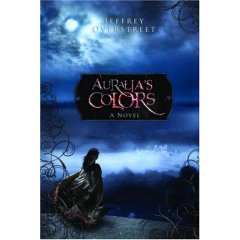At first glance, Auralia’s Colors may have a beautiful cover with an intriguing back copy. I was interested when hearing about the book a few months ago on Becky Miller’s blog. What you get when you open the pages is the literary equivalent of a master tapestry.
Trying to write a book that prominently features colors is an inspiration that I don’t envy. However, Jeffrey Overstreet’s first novel is truly an amazing accomplishment.
It doesn’t really have a comparison in Christian fiction. That is definitely a good thing (as it shows that this “genre” is growing), but it can be a little harder to characterize it then.
I haven’t been to a lot of blogs on this tour yet, but one word that keeps coming up is literary. I think what is meant by that is that the book treats language as a beautiful thing in and of itself, rather than being secondary to the plot or action. The book seems to be carefully crafted, and the choice of words is very picturesque. Even though a major theme is color and beauty, the descriptions of birds taking flight, people’s reactions, and other things that could be mundane paint just as compelling of imagery in the reader’s mind.
The book takes chances aplenty, and it wins on a lot of them. One of the main characters is only called “ale boy” throughout the book. The plot zigs instead of zagging. There are surprises toward the end that I really didn’t see coming. The themes are deeply spiritual, but not clearly allegorical: you can not pin “this is Jesus” on one character and “this is Satan” on another. The mysterious Keeper stays mysterious throughout, and it is not fully revealed. It allows the reader to mine their own conclusions from the book.
Even though this book was very enjoyable, it didn’t quite make my list of top books for 2007. I’m sure part of this is just my taste in books – I am usually drawn to a little more fast and furious. Still, some of the plot took a long time to describe without discernible payoff later on in the book, and overall the book seems a little too much like a set-up for the whole series. I am sure it is a very hard thing to make one book self-sufficient and inclusive when imagining a whole series, but as I think about it, this is the reason that the book didn’t fully resonate with me.
Overall, this book is a very welcome entry into Christian fiction, and is a well-crafted, entertaining work that should be read by any fan of fantasy. This colorful literature is one of the most important books in Christian speculative fiction in a long time, due to its creativity and daring.

Jason,
Thanks for stopping by my blog. I agree that Jeffrey Overstreet did take a lot of chances and that he did win on most. It was odd that the Ale Boy’s name was never given, but I suppose that is part of the mystery, and he seems to like keeping things hidden from us to tantalize us along.
It was also true that he kept the mundane very poetic. I can’t really recall any time he duplicated a phrasing … he was a very creative writer.
Thanks for your review and looking forward to reading more of your site. I see you’re a Rich Mullins fan like me. It’s still hard to believe he’s gone.
Poetic is a good description for the book like Robert said.
Funny that you describe the book as “truly an amazing accomplishment” but then say it isn’t one of your favorites.
Did you find yourself appreciating the artistry without being engaged in the story? I’m curious.